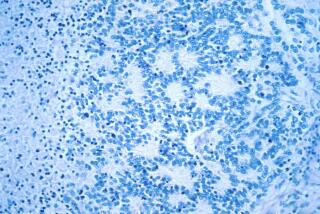Drug Slows AIDS, French Doctors Say
- Share via
PARIS — Three French doctors said Tuesday that they have succeeded in dramatically slowing the development of AIDS by using a drug commonly given to prevent rejection of transplanted organs.
The treatment, paradoxically, allows the AIDS-ravaged immune system to repair itself by temporarily suppressing its function, the doctors said.
Drs. Philippe Even, Jean-Marie Andrieu and Alain Venet cautioned in announcing their discovery that they have tried the treatment on only six patients, beginning just one week ago. Two of the patients showed “dramatic” improvement, they said.
Andrieu said that despite the few patients tested, the “spectacular results” persuaded the three doctors that their findings should immediately be made public for “ethical” reasons.
Usually Fatal
AIDS--acquired immune deficiency syndrome--is usually fatal.
While stressing that the treatment does not represent a cure, since no drug has yet been discovered to eliminate the virus, the three researchers at the Laennec Hospital in Paris say the therapy may allow for long-term maintenance of AIDS-stricken patients.
The most important development, the three doctors told a news conference, is that the temporary suppression of the immune system in AIDS patients with the drug cyclosporine enables the crucial T-4 white blood cells of the immune system to redevelop.
The AIDS virus reproduces in the T-4 cells, and in doing so, kills them. Venet said the cyclosporine acts on the T-4 cells, “deactivating” them and thereby preventing the AIDS virus from using the cells’ mechanisms to reproduce.
Even said he and his colleagues have witnessed “dramatic biological results” in two patients over the last week, one of whom was suffering from the fully developed AIDS condition and considered to be near death. The other was suffering from the early phase of the disease, known as AIDS related complex.
AIDS attacks the body’s immune system, eventually depleting it and making the body vulnerable to disease and infection. In the United States, the disease is most common among homosexuals, intravenous drug users and hemophiliacs, who often undergo blood transfusions.
T-4 Cells Multiplied
The more severely stricken patient in the test was administered cyclosporine orally. Within two days, he showed a sharp increase in the number of T-4 cells, rising from none at all before the treatment to a count of 350 today, the doctors said.
The condition of this patient, a 38-year-old man suffering from AIDS for two years, also improved dramatically, the physicians said. Without the treatment, “This patient would probably be dead today,” Even said.
In a second patient, a 35-year-old woman suffering from the pre-AIDS condition commonly referred to as ARC, the swelling of the lymph glands, a main symptom of AIDS in its early stages, was reduced. Her T-4 cell count also rose dramatically, the doctors said.
Although the T-4 cells cannot protect the human system when the patient is being treated with cyclosporine, Even said, the immune system can be built up and reactivated if the patient develops a subsequent infection as a result of his weakened condition.
“It’s better to have a reserve army than no army at all,” said Andrieu.
No Firm Evidence
Although the researchers have been able to measure improvements in their patients’ T-4 counts, they could not offer firm evidence that cyclosporine halts the reproduction of the AIDS virus.
The physicians, all attached to the hospital’s respiratory diseases service, acknowledged they had departed from the normal method by which medical discoveries are made known, through publication in specialized journals.
Even, chief of the hospital’s respiratory diseases service, said he and his colleagues called the news conference to assure wide and immediate publication of their discovery. He said an article on the treatment has been submitted to the respected British medical journal Lancet.
More to Read
Sign up for Essential California
The most important California stories and recommendations in your inbox every morning.
You may occasionally receive promotional content from the Los Angeles Times.










